Headlines
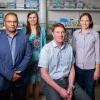 NSF has announced a $20 million grant to CU Boulder to launch the National Quantum Nanofab (NQN) facility, where Colorado researchers and quantum specialists from around the country will be able to design and build incredibly small devices that tap into the world of atoms and photons.
NSF has announced a $20 million grant to CU Boulder to launch the National Quantum Nanofab (NQN) facility, where Colorado researchers and quantum specialists from around the country will be able to design and build incredibly small devices that tap into the world of atoms and photons.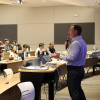 Earlier this year, SPIE, the society for optics and photonics, committed to matching $100K in external gifts to the Quantum Scholars program over the next two years. The substantial commitment has spurred action from industry and donors, resulting in a growing list of supporters.
Earlier this year, SPIE, the society for optics and photonics, committed to matching $100K in external gifts to the Quantum Scholars program over the next two years. The substantial commitment has spurred action from industry and donors, resulting in a growing list of supporters.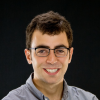 The award, named after the esteemed German astronomer and mathematician, is awarded annually to around 20 internationally renowned academics. It includes a €45,000 grant and the opportunity to conduct a research project of the recipient's choice at a German research institution.
The award, named after the esteemed German astronomer and mathematician, is awarded annually to around 20 internationally renowned academics. It includes a €45,000 grant and the opportunity to conduct a research project of the recipient's choice at a German research institution.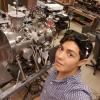 The Deborah Jin Award, presented to Young by the American Physical Society (APS), recognizes Young's doctoral thesis research on a new experimental setup to control many-body quantum systems that combines the techniques of optical tweezers, precision spectroscopy and quantum gas microscopy.
The Deborah Jin Award, presented to Young by the American Physical Society (APS), recognizes Young's doctoral thesis research on a new experimental setup to control many-body quantum systems that combines the techniques of optical tweezers, precision spectroscopy and quantum gas microscopy.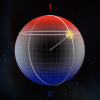 In collaboration with Professor Shuo Sun (Physics, JILA), Assistant Professor Andrés Montoya-Castillo (Chemistry) and his team have developed a new method for better understanding and controlling "noise"—environmental disturbances that can disrupt the delicate state of a quantum system.
In collaboration with Professor Shuo Sun (Physics, JILA), Assistant Professor Andrés Montoya-Castillo (Chemistry) and his team have developed a new method for better understanding and controlling "noise"—environmental disturbances that can disrupt the delicate state of a quantum system.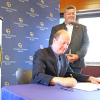 Earlier this week at JILA, Governor Polis signed legislation to support and strengthen Colorado's nation-leading quantum industry. A historic state investment of up to $74 million positions the state to compete for historic federal funds that will create a quantum boom in Colorado.
Earlier this week at JILA, Governor Polis signed legislation to support and strengthen Colorado's nation-leading quantum industry. A historic state investment of up to $74 million positions the state to compete for historic federal funds that will create a quantum boom in Colorado.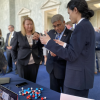 Heather Lewandowski (JILA, Physics) and graduate student Qizhong Liang represented CU Boulder at the event, which highlighted the pivotal role of federal funding in advancing quantum research and the potential of government-funded quantum initiatives nationwide.
Heather Lewandowski (JILA, Physics) and graduate student Qizhong Liang represented CU Boulder at the event, which highlighted the pivotal role of federal funding in advancing quantum research and the potential of government-funded quantum initiatives nationwide.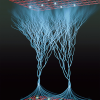 Adam Kaufman (JILA, NIST, Physics) and his team have demonstrated a novel method of boson sampling using ultracold bosonic atoms in a two-dimensional optical lattice and sophisticated laser cooling techniques that reduce noise and decoherence—common challenges in quantum experiments.
Adam Kaufman (JILA, NIST, Physics) and his team have demonstrated a novel method of boson sampling using ultracold bosonic atoms in a two-dimensional optical lattice and sophisticated laser cooling techniques that reduce noise and decoherence—common challenges in quantum experiments.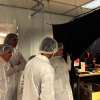 “This is the first time the program brought the scholars into a working quantum company," said Professor Michael Ritzwoller (Physics). “The ability to witness quantum research in an industrial setting is a mind-expanding experience for the quantum scholars, which will help guide their future professional development.”
“This is the first time the program brought the scholars into a working quantum company," said Professor Michael Ritzwoller (Physics). “The ability to witness quantum research in an industrial setting is a mind-expanding experience for the quantum scholars, which will help guide their future professional development.”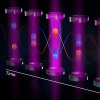 JILA Fellows Ana Maria Rey, James Thompson, Murray Holland and their teams have demonstrated a new type of atomic interaction with big implications for quantum sensing. Momentum-exchange interaction could help overcome the problem of "atomic recoil" that occurs when an atom interacts with a photon.
JILA Fellows Ana Maria Rey, James Thompson, Murray Holland and their teams have demonstrated a new type of atomic interaction with big implications for quantum sensing. Momentum-exchange interaction could help overcome the problem of "atomic recoil" that occurs when an atom interacts with a photon.

